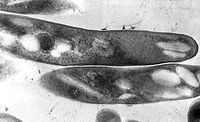
Photo from wikipedia
Mycoplasma bovis (M. bovis) is an emerging devastating cause of pneumonia in dairy and feedlot calves around the world, largely due to its increasing resistance to new generation effective antibiotics and… Click to show full abstract
Mycoplasma bovis (M. bovis) is an emerging devastating cause of pneumonia in dairy and feedlot calves around the world, largely due to its increasing resistance to new generation effective antibiotics and lack of efficient vaccine. Failure of protective measures against M. bovis is mainly due to nonspecific targets. Most of the virulent factors of M. bovis and their underlying mechanisms are obscure to devise an effective control strategy. Full genome sequences of M. bovis strains basically provided a useful platform for the accurate identification of novel proteins and understanding their biological value using proteomics tools. Most of the previously documented proteins of M. bovis are involved in adhesion to host cells and are antigenic in nature. However, host immune response to some antigens proved to be non-protective. For the diagnosis of M. bovis infection, a serological assay based on whole cell proteins of M. bovis is commercially available but the specificity is likely to be improved by identifying and targeting the specific proteins. Many of the predicted proteins of M. bovis remain hypothetical, as their functions are yet to be confirmed experimentally. This review mainly focuses on the proteomics analysis of M. bovis and its role in identification of the virulence related factors and antigenic proteins of M. bovis. Future research directions have also been highlighted in this script for the application of important antigenic factors of M. bovis.
Journal Title: Microbial pathogenesis
Year Published: 2017
Link to full text (if available)
Share on Social Media: Sign Up to like & get
recommendations!